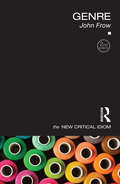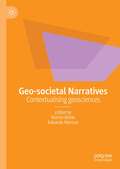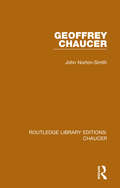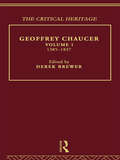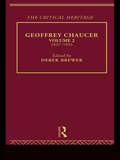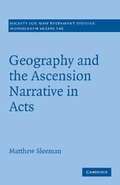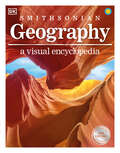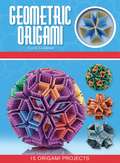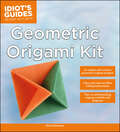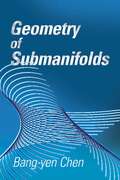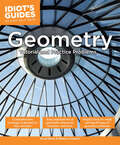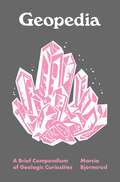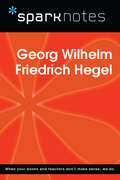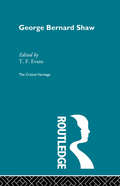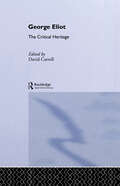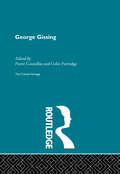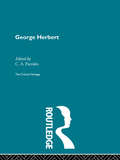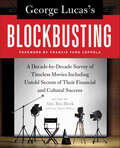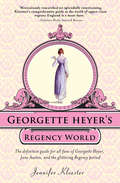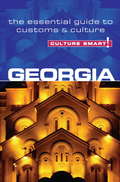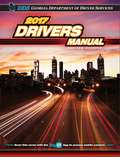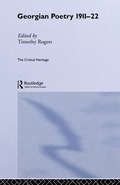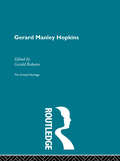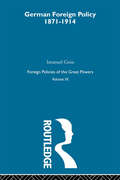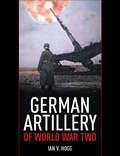- Table View
- List View
Genre (The New Critical Idiom)
by John FrowThis second edition of John Frow’s Genre offers a comprehensive and accessible introduction to the area. Genre is a key means by which we categorize the many forms of literature and culture, but it is also much more than that: in talk and writing, in music and images, in film and television, genres actively generate and shape our knowledge of the world. Understanding genre as a dynamic process rather than a set of stable rules, this book explores: the relation of simple to complex genres the history of literary genre in theory the generic organisation of implied meanings the structuring of interpretation by genre the uses of genre in teaching. John Frow’s lucid exploration of this fascinating concept has become essential reading for students of literary and cultural studies, and the second edition expands on the original to take account of recent debates in genre theory and the emergence of digital genres.
Geo-societal Narratives: Contextualising geosciences
by Martin Bohle Eduardo MaroneThis book provides an accessible overview of the societal relevance of contemporary geosciences. Engaging various disciplines from humanities and social sciences, the book offers philosophical, cultural, economic, and geoscientific insights into how to contextualise geosciences in the node of Culture and Nature.The authors introduce two perspectives of societal geosciences, both informed by the lens of geoethics. Throughout the text core themes are explored; human agency, the integrity of place, geo-centricity, economy and climate justice, subjective sense-making and spirituality, nationalism, participatory empowerment and leadership in times of anthropogenic global change. The book concludes with a discussion on culture, education, or philosophy of science as aggregating concepts of seemingly disjunct narratives.The diverse intellectual homes of the authors offer a rich resource in terms of how they perceive human agency within the Earth system. Two geoscientific perspectives and fourteen narratives from various cultural, social and political viewpoints contextualise geosciences in the World(s) of the Anthropocene.
Geoffrey Chaucer (Routledge Library Editions: Chaucer)
by John Norton-SmithOriginally published in 1974. This book discusses those aspects of Chaucer’s art which are concerned with the problem of specific form. These aspects have been concentrated on by the author for Chaucer’s major poems and some of his so-called minor poems in separate chapters. It offers a critical evaluation of some specific literary achievements of one of the most important authors of the medieval period. The author extensively compares Chaucer's poetic technique to contemporary French poets and preceding poetic structure.
Geoffrey Chaucer: The Critical Heritage Volume 1 1385-1837 (Critical Heritage Ser.)
by Derek BrewerFirst published in 1995. Routledge is an imprint of Taylor & Francis, an informa company.
Geoffrey Chaucer: The Critical Heritage Volume 2 1837-1933 (Critical Heritage Ser.)
by Derek BrewerFirst published in 1995. Routledge is an imprint of Taylor & Francis, an informa company.
Geography and the Ascension Narrative in Acts
by Matthew SleemanThe book of Acts contains a strong geographical component. Yet readings of Acts typically ignore or marginalise geography's contribution to the construction of the narrative's theology. In this book Matthew Sleeman argues that Jesus' ascension into heaven is foundational for establishing the 'spatiality' of Acts, showing that the narrative's understanding of place and space is shaped decisively by Christ's heavenly location. Drawing on recent advances in geographical theory, Sleeman offers a 'spatial' interpretation that expands our vision of how space and place inform the theological impulses of Acts. Presenting a complement to conventional 'temporal' readings of Acts, he sheds new light on the theology of the book, and suggests new ways of reading not only Acts but also other New Testament texts. Sleeman's work combines innovative biblical scholarship with accessible and informative geographical analysis, and is suitable for those with research and teaching interests in human geography or biblical studies.
Geography: A Visual Encyclopedia
by DKLearn all about geography on planet Earth in this jam-packed visual encyclopedia for children.Get to know the processes that shape our world through amazing facts and colorful diagrams in this fully updated edition of the popular Geography A Children’s Encyclopedia.This encyclopedia for children aged 9-12 is full of beautiful pictures that bring the natural world to life and show Earth’s most amazing features. Each concept is broken down clearly, with colorful diagrams describing geological processes, while the water cycle and the structure of a rainforest canopy are fully explained.This geography book for kids offers:All aspects of physical and human geography explained clearly with the help of maps and country factfiles.A refreshed and updated edition, including a new design and the latest facts and stats on the subject.An essential reference for children, looking at the latest topics like the effects of climate change.Learn about the processes that shape our world, from ice ages to global warming, earthquakes to tsunamis, and explore the wonders of the natural world, from the peak of Mount Everest to the very bottom of the Mariana Trench.Children can carry the world wherever they go, from the deserts of Africa to the low countries of Europe, the lush forests of Brazil to the coral reefs of Indonesia and Australia. This encyclopedia expands horizons and is a fantastic resource for children interested in geography, geology, environmental science, and sociology.Explore the series!Globally, the Children’s Encyclopedia series has sold more than 4 million copies worldwide. Uncover the marvels of our world with Science, explore the deep blue with Ocean, discover our solar system and beyond with Space, understand anatomy with Human Body, and get to grips with world-famous sculptures with Art.
Geometric Origami (Origami Books)
by Faye GoldmanToo hip to be square, Geometric Origami takes the art of paper folding to stunning new heights.A sophisticated new origami kit for advanced paper-folding enthusiasts, Geometric Origami takes paper art to spectacular new levels. Fifteen intricate paper projects use specially designed strips that come with the book and include a tetrahedron, hexahedron, octahedron, dodecahedron, icosahedron, truncated tetrahedron, cuboctahedron, icosidodecahedron, rhombic triacontahedron, snub dodecahedron, zonohedron, and buckyballs. And don't worry - there are even a few pronounceable shapes like the egg and a geometric bracelet, plus more surprises. This beautifully designed kit gives a new perspective on geometry and the world of origami and is great fun for the entire family - or the perfect gift for a math professor.
Geometric Origami Kit (Idiot's Guides)
by Nick RobinsonIncludes 80 sheets of Origami paper! Idiot's Guides: Geometric Origami Kit makes learning this art easy and fun. For the young or young-at-heart, this full-color book offers 20 beautiful geometric Origami projects and 80 sheets of Origami paper to construct them. In addition, lay-flat spiral binding makes the detailed steps even easier to follow.
Geometry of Submanifolds (Dover Books on Mathematics)
by Bang-Yen ChenThe first two chapters of this frequently cited reference provide background material in Riemannian geometry and the theory of submanifolds. Subsequent chapters explore minimal submanifolds, submanifolds with parallel mean curvature vector, conformally flat manifolds, and umbilical manifolds. The final chapter discusses geometric inequalities of submanifolds, results in Morse theory and their applications, and total mean curvature of a submanifold.Suitable for graduate students and mathematicians in the area of classical and modern differential geometries, the treatment is largely self-contained. Problems sets conclude each chapter, and an extensive bibliography provides background for students wishing to conduct further research in this area. This new edition includes the author's corrections.
Geometry: Tutorial and Practical Problems (Idiot's Guides)
by Rebecca Dayton Sonal BhattCovering everything a student would encounter in a high school or college course, Idiot's Guides: Geometry explains concepts in the easiest possible manner. Content includes everything from the basics of geometry; reasoning and proof; triangles; quadrilaterals; area and volume; similarity, perpendicular and parallel lines; and much more. This all-new book integrates a practice problems section to reinforce lessons. In addition, a glossary of geometry terms, postulates, and theorems provides a quick reference to need-to-know information.
Geopedia: A Brief Compendium of Geologic Curiosities (Pedia Books #6)
by Marcia BjornerudA garden of geologic delights for all EarthlingsGeopedia is a trove of geologic wonders and the evocative terms that humans have devised to describe them. Featuring dozens of entries—from Acasta gneiss to Zircon—this illustrated compendium is brimming with lapidary and lexical insights that will delight rockhounds and word lovers alike.Geoscientists are magpies for words, and with good reason. The sheer profusion of minerals, landforms, and geologic events produced by our creative planet demands an immense vocabulary to match. Marcia Bjornerud shows how this lexicon reflects not only the diversity of rocks and geologic processes but also the long history of human interactions with them.With wit and warmth, she invites all readers to celebrate the geologic glossary—a gallimaufry of allusions to mythology, imports from diverse languages, embarrassing anachronisms, and recent neologisms. This captivating book includes cross-references at the end of each entry, inviting you to leave the alphabetic trail and meander through it like a river. Its pocket-friendly size makes it the perfect travel companion no matter where your own geologic forays may lead you.With whimsical illustrations by Haley Hagerman, Geopedia is a mix of engaging and entertaining facts about how the earth works, how it has coevolved with life over billions of years, and how our understanding of the planet has deepened over time.Features a real cloth cover with an elaborate foil-stamped design
Georg Wilhelm Friedrich Hegel (SparkNotes Philosophy Guide)
by SparkNotesGeorg Wilhelm Friedrich Hegel (SparkNotes Philosophy Guide) Making the reading experience fun! SparkNotes Philosophy Guides are one-stop guides to the great works of philosophy–masterpieces that stand at the foundations of Western thought. Inside each Philosophy Guide you&’ll find insightful overviews of great philosophical works of the Western world.
George Bernard Shaw
by T. F. EvansThis set comprises 40 volumes covering nineteenth and twentieth century European and American authors. These volumes will be available as a complete set, mini boxed sets (by theme) or as individual volumes. This second set compliments the first 68 volume set of Critical Heritage published by Routledge in October 1995.
George Eliot: The Critical Heritage (The\critical Heritage Ser.)
by David CarrollThe Critical Heritage gathers together a large body of critical sources on major figures in literature. Each volume presents contemporary responses to a writer's work, enabling students and researchers to read for themselves, for example, comments on early performances of Shakespeare's plays, or reactions to the first publication of Jane Austen's novels.The carefully selected sources range from landmark essays in the history of criticism to journalism and contemporary opinion, and little published documentary material such as letters and diaries. Significant pieces of criticism from later periods are also included, in order to demonstrate the fluctuations in an author's reputation.Each volume contains an introduction to the writer's published works, a selected bibliography, and an index of works, authors and subjects.The Collected Critical Heritage set will be available as a set of 68 volumes and the series will also be available in mini sets selected by period (in slipcase boxes) and as individual volumes.
George Gissing: The Critical Heritage (1880-1920 British Authors Ser. #No. 2)
by Pierre Coustillas Colin PartridgeThe Critical Heritage gathers together a large body of critical sources on major figures in literature. Each volume presents contemporary responses to a writer's work, enabling students and researchers to read for themselves, for example, comments on early performances of Shakespeare's plays, or reactions to the first publication of Jane Austen's novels.The carefully selected sources range from landmark essays in the history of criticism to journalism and contemporary opinion, and little published documentary material such as letters and diaries. Significant pieces of criticism from later periods are also included, in order to demonstrate the fluctuations in an author's reputation.Each volume contains an introduction to the writer's published works, a selected bibliography, and an index of works, authors and subjects.The Collected Critical Heritage set will be available as a set of 68 volumes and the series will also be available in mini sets selected by period (in slipcase boxes) and as individual volumes.
George Herbert: The Critical Heritage
by C. A. PatridesFirst Published in 1995. The Critical Heritage gathers together a large body of critical sources on major figures in literature. Each volume presents contemporary responses to a writer's work, enabling students and researchers to read for themselves, for example, comments on early performances of Shakespeare's plays, or reactions to the first publication of Jane Austen's novels. The carefully selected sources range from landmark essays in the history of criticism to journalism and contemporary opinion, and little published documentary material such as letters and diaries. Significant pieces of criticism from later periods are also included, in order to demonstrate the fluctuations in an author's reputation. Each volume contains an introduction to the writer's published works, a selected bibliography, and an index of works, authors and subjects. The Collected Critical Heritage set will be available as a set of 68 volumes and the series will also be available in mini sets selected by period (in slipcase boxes) and as individual volumes.
George Lucas's Blockbusting: A Decade-by-Decade Survey of Timeless Movies Including Untold Secrets of Their Financial and Cultural Success
by Lucy Autrey Wilson Alex Ben BlockA comprehensive look at 300 of the most financially and/or critically successful motion pictures of all time—many made despite seemingly insurmountable economic, cultural, and political challenges—set against the prevailing production, distribution, exhibition, marketing, and technology trends of each decade in movie business history.
Georgette Heyer's Regency World: The Definitive Guide For All Fans Of Georgette Heyer, Jane Austen, And The Glittering Regency Period
by Jennifer KloesterThe definitive guide for all fans of Georgette Heyer, Jane Austen, and the glittering Regency period"Detailed, informative, impressively researched. A Heyer lover writing for Heyer fans." —Times Literary SupplementImmerse yourself in the resplendent glow of Regency England and the world of Georgette Heyer...From the fascinating slang, the elegant fashions, the precise ways the bon ton ate, drank, danced, and flirted, to the shocking real life scandals of the day, Georgette Heyer's Regency World takes you behind the scenes of Heyer's captivating novels.As much fun to read as Heyer's own novels, beautifully illustrated, and meticulously researched, Jennifer Kloester's essential guide brings the world of the Regency to life for Heyer fans and Jane Austen fans alike."An invaluable guide to the world of the bon ton. No lover of Georgette Heyer's novels should be without it." — Katie Fforde"Splendidly entertaining" —Publishers Weekly"Meticulously researched yet splendidly entertaining, Kloester's comprehensive guide to the world of upper-class regency England is a must-have." —Publishers Weekly Starred Review
Georgia - Culture Smart!
by Natia AbramiaGeorgia lies between Eastern Europe, Central Asia, and the Middle East, on the southeastern shore of the Black Sea. This small Caucasian country is used to playing a significant role in global geopolitics, and its strategic location at the crossroads of different civilizations has been a curse as well as a blessing. Once a battlefield of the Christian and Muslim worlds, today it is caught between its NATO aspirations and its location in Russia's backyard. The Silk Road brought the best of the world to Georgia. Its ancient Christian culture shows the influence of Arab, Persian, and Ottoman conquerors. Combined with this is a southern, "Mediterranean" feel, traces of the Soviet legacy, and a strong Western influence. What awaits the visitor is a unique culture that goes back thousands of years. Georgia has a rich historical heritage, wonderful food and wines, unforgettable scenery, authentic folk music and dances, an attractive business climate, and an educated and hospitable people for whom indulging a guest is more a religion than a duty. Culture Smart! Georgia offers invaluable insights and practical tips for tourists and business people alike. The author, Natia Abramia, guides you through the past and present-day realities of her motherland, explaining what makes people tick, how they live and feel, and how to get on with them. You will discover that the Georgians will not let you down. Learn how to reach their hearts, and they will charm you back.
Georgia 2017 Driver's Manual
by Georgia Department of Driver ServicesThis manual is produced by the Regulatory Compliance Division of Georgia Department of Driver Services. The information contained in this manual is not intended to be an official legal reference to the Georgia traffic laws. It is intended only to explain, in everyday language, those laws, driving practices, and procedures that you will use most often. It should be noted that the material in this manual is subject to change to comply with amended State and Federal legislation. The department’s primary statutory responsibilities are set forth in Title 40 of the Official Code of Georgia Annotated (O.C.G.A.)
Georgian Poetry 1911-22
by Timothy RogersThis set comprises 40 volumes covering 19th and 20th century European and American authors. These volumes will be available as a complete set, mini boxed sets (by theme) or as individual volumes. This second set complements the first 68 volume set of Critical Heritage published by Routledge in October 1995.
Gerard Manley Hopkins: The Critical Heritage (Critical Heritage Ser.)
by Gerald RobertsThe Critical Heritage gathers together a large body of critical sources on major figures in literature. Each volume presents contemporary responses to a writer's work, enabling students and researchers to read for themselves, for example, comments on early performances of Shakespeare's plays, or reactions to the first publication of Jane Austen's novels. The carefully selected sources range from landmark essays in the history of criticism to journalism and contemporary opinion, and little published documentary material such as letters and diaries. Significant pieces of criticism from later periods are also included, in order to demonstrate the fluctuations in an author's reputation. Each volume contains an introduction to the writer's published works, a selected bibliography, and an index of works, authors and subjects. The Collected Critical Heritage set will be available as a set of 68 volumes and the series will also be available in mini sets selected by period (in slipcase boxes) and as individual volumes.
Germ Foreign Pol 1871-1914 V9
by GeissFirst Published in 2001. Routledge is an imprint of Taylor & Francis, an informa company.
German Artillery of World War Two
by Ian V. Hogg&“The best reference there is to this day about the guns and ammunition used by the German armed forces in WW2.&” —Military Modelling The complete story of German artillery during World War Two, this illustrated volume is divided into sections according to the weapon classes: Infantry, Mountain and Field Artillery, Heavy Field Artillery, Heavy Artillery, Railway Artillery, Anti-Aircraft Artillery, Anti-Tank Artillery, Coastal Artillery and Recoilless Artillery.German Artillery of World War Two also contains details of the general organization of the German artillery arm, together with development histories of the weapons and their ammunition. In addition, the book contains a series of comprehensive data tables, and appendices including a glossary of technical terms. The first edition of this book, published over twenty years ago, is highly sought after by collectors and enthusiasts today. This new edition brings an enduring classic to a new generation of readers.&“A classic on modern artillery by Ian V. Hogg, this volume is well-established and must be regarded as a standard reference work on the subject.&” —Gun Mart&“This is both a valuable reference book and an absorbing read.&” —British Army Review
